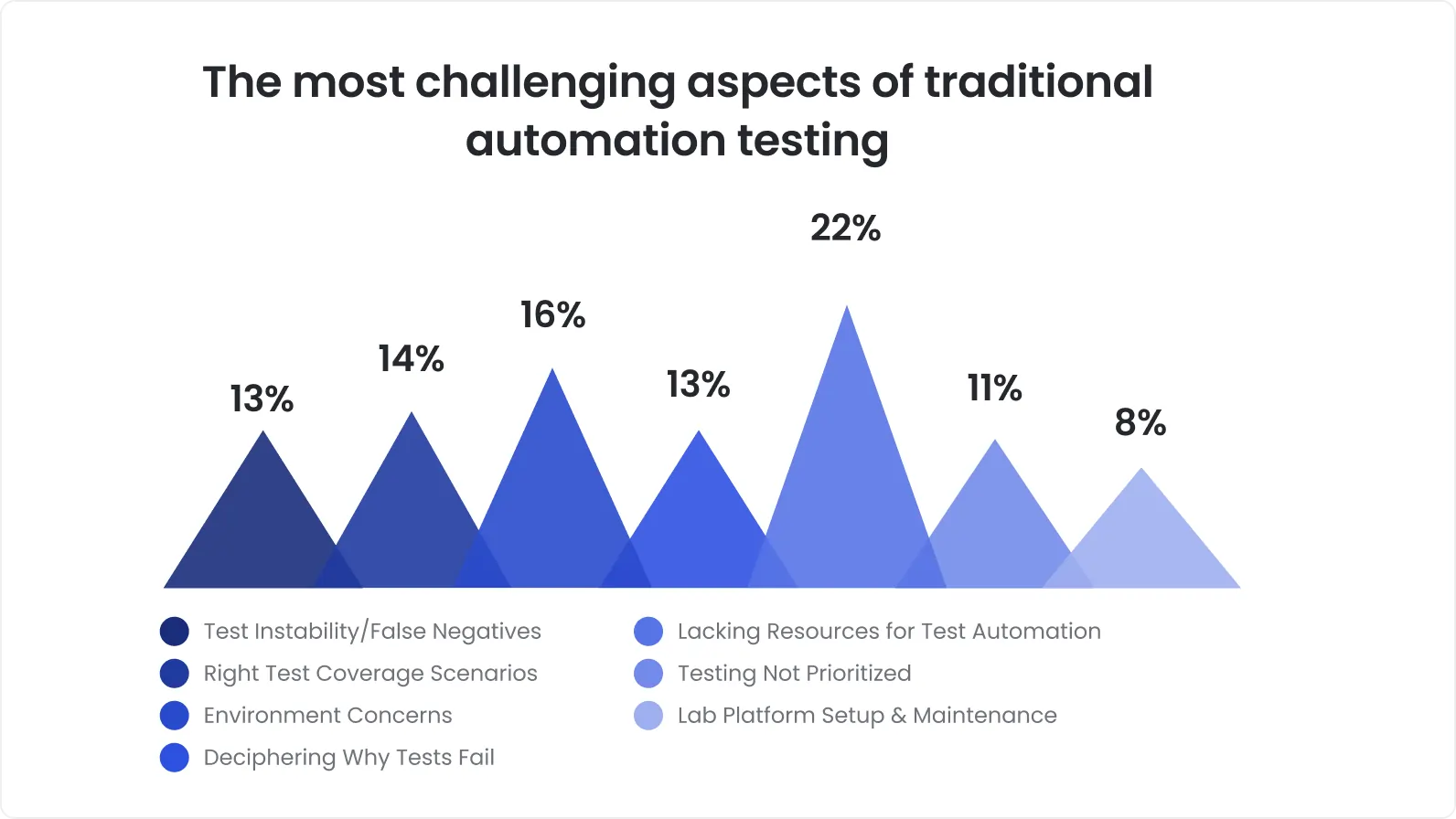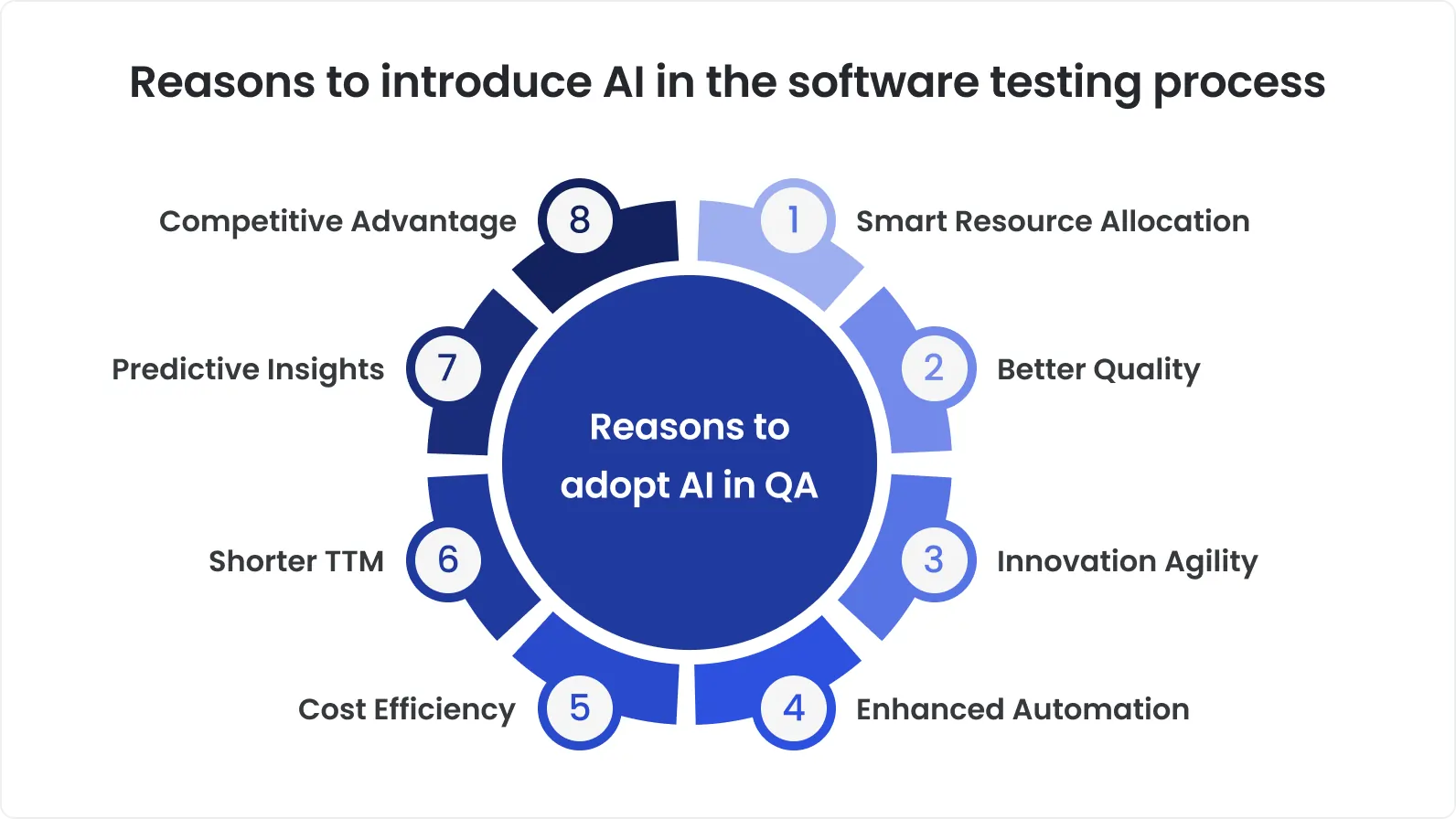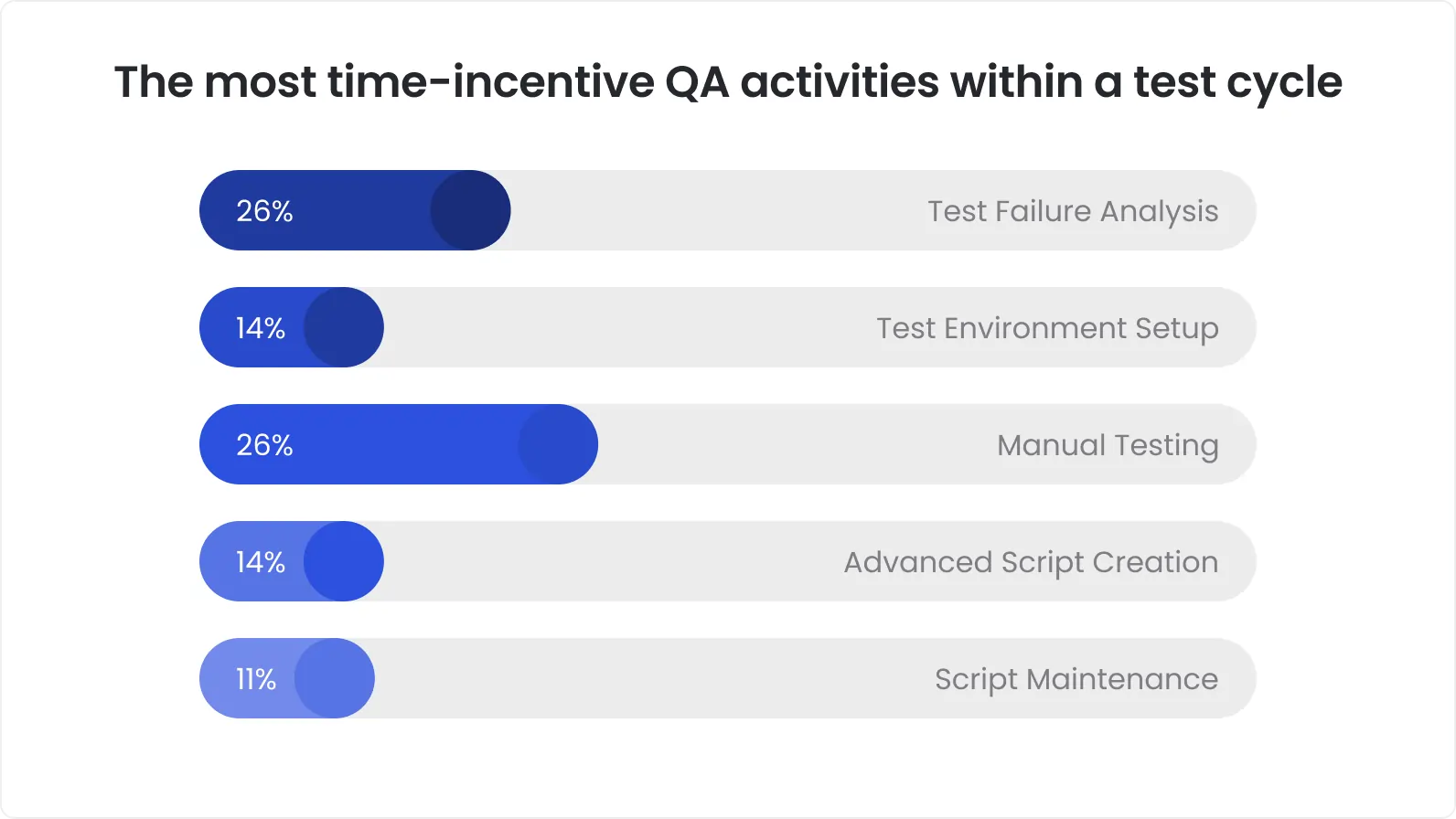17 minutes to read
What are the advantages of AI in testing?


Chief Technology Officer
Can you imagine automating nearly 70% of QA tasks?
That’s not a fantasy but a reality with the power of AI. Its amazing capabilities open new opportunities for QA experts and take software testing to the next level. In this article, we highlight some of the key benefits of AI adoption in QA and software testing. Also, we’ll discuss why conventional testing struggles to meet the needs of modern businesses, outline compelling reasons to use AI-driven automation testing, and take a look into the future of AI in quality assurance.
Is combining artificial intelligence and software testing the way to go?
The pace of modern life is extremely fast. This is particularly true in the tech environment. Software testing companies all over the world strive to deliver new products and updates at lightning speed in order to be pioneers in the market and meet the needs and expectations of users who become more and more picky.
The demand for super-quick product delivery drives the need for shorter software development and testing cycles. While some types of testing, for instance, regression testing, smoke testing, performance testing, etc., have already been automated, this alone is not enough to keep up with the pace.
Fortify your AI transformation with bulletproof testing
The most time-incentive QA activities within a test cycle
QA teams keep on facing numerous challenges, as many tasks are still handled manually. It is not only about testing complicated scenarios manually—test design, test case writing, test data generation, test script development and maintenance, test analysis, and other activities take a ton of time and effort due to being performed manually. Consequently, achieving top-notch quality often results in delayed product delivery, while prioritized speed usually compromises product quality. This proves that conventional testing fails to meet business needs as well as highlights that it is time to consider new approaches, particularly introducing AI.
Since modern AI systems possess abilities associated with human intelligence, such as planning, problem-solving, self-learning, reasoning, prediction, and manipulation, they can automate a lot of tasks that earlier were considered solely within human expertise. No need to mention that AI in test automation can provide impressive advancements, optimizing and accelerating the whole QA process.
Combining artificial intelligence and software testing is extremely beneficial, as the outstanding capabilities of AI can help teams achieve strategic goals more efficiently—something that is impossible with traditional testing.
The main differences between AI and traditional software testing
Traditional software testing has served faithfully for a long time, but times have changed. These days, AI-driven testing is gaining traction since it offers numerous opportunities and benefits that conventional testing lacks. Using various ML algorithms, NLP, computer vision, predictive analysis, and other techniques, AI-powered tools automate many QA tasks, streamlining the testing process.
Here's a list of key differences between AI-driven and traditional software testing.
Test case generation
Labor-intensive as test cases are written by testers based on requirements
Test cases are generated by AI, often covering more scenarios
Test run speed
Slower, as manual testing and traditional automated testing take more time
Faster, as AI can prioritize, optimize, and run automated tests continuously
Bug detection
Reactive, as bugs are found mostly after test failures or in production
Predictive, as AI recognizes patterns and predicts bugs before they occur
Test coverage
Limited by time and labor resources
Higher, as AI tools dynamically increase coverage across scenarios
Script maintenance
Test scripts are updated manually after software changes
AI automatically updates test scripts based on changes in code or functionality
Bug analysis
An analysis is carried out by testers, leading to slower root cause identification
AI provides rapid error analysis, clustering similar issues
Test prioritization
Manual test prioritization and selection
AI-driven prioritization, focused on high-impact and high-risk areas
Feedback loop
Slower due to manual report generation and issue tracking
Faster, as AI generates automatic reports and provides real-time insights
Labor resources
Requires large testing teams and extensive manual effort
Requires fewer resources as AI handles the majority of repetitive tasks
Scalability
Limited by manpower and infrastructure
Scalable, as AI can handle large-scale testing across environments
Cost efficiency
Higher costs due to manual efforts and longer timelines
Lower costs, as AI reduces redundant work and optimizes resource allocation
Challenges of conventional software testing
Traditional software testing heavily relies on manual testing. Many types of testing are still executed manually, as well as many other QA-related tasks are performed by testers. Consequently, this approach takes a lot of time and immensely slows down QA processes. However, automation is actually also used to a certain extent. Surely, it helps accelerate processes, but the level of automation within traditional testing cannot provide the speed and adaptability required in today’s development environments. QA experts still waste a wealth of time and effort on setting up test environments, writing test cases, maintaining and refactoring test scripts, etc.

To see the big picture, let’s outline some of the key drawbacks of traditional software testing:
Slow and time-consuming test cycles
Within conventional testing, the scope of automation is rather limited. Testers often address test case writing and maintenance, test data generation, test environment setup and configuration, test result analysis, etc. on their own. As a result, the testing process takes a lot of time and adds strain on QA teams.
High test script maintenance efforts
Test scripts streamline test execution, provided they are relevant and up-to-date. Minor code changes can lead to failures in automated scripts. Keeping up with constant changes in the application code requires frequent test updates, which is time- and labor-intensive, as automation QA engineers maintain scripts manually.
Test script flakiness
Another persistent challenge in usual automated testing is flakiness. Sometimes QA teams suffer from flaky tests. These tests are inconsistent and provide unreliable results, sometimes passing and sometimes failing under the same conditions. They reduce trust in the testing process, create confusion, and take time to diagnose false failures.
Limited test coverage
To carefully test modern complex apps, covering all possible combinations and edge cases, a large volume of test cases and test scripts would need to be created, executed, and maintained. However, considering the time and resource constraints, QA teams are usually forced to cut down on coverage and focus only on high-priority tests. This results in the inability to find bugs in less common but potentially impactful flows.
Reactive bug detection
As a rule, traditional testing detects bugs after they occur rather than predicting potential issues in advance. This reactive approach slows down development cycles. When defects are detected later in the software development process, bug fixing can cause unexpected delays and increase development costs.
High cost
Due to significant manual efforts, extensive maintenance needs, and limited automation, traditional testing demands a lot of resources and costs. The maintenance of a large QA team to cover all testing needs costs a fortune, especially for startups. According to the statistical data, testing costs can reach 40-50% of a total project budget.
Key advantages of artificial intelligence in software testing
AI adoption opens a new era in software testing—no kidding. This is explained by the numerous benefits that AI implementation in QA brings. Below are some of the most prominent advantages of AI in software testing:
Simulation of user interactions
Different user interactions and environmental conditions can be easily simulated by AI, allowing teams to test apps against numerous real-world scenarios. AI mimics various patterns of user behaviors, which helps to ensure flawless app operation under different conditions.
Efficient bug identification
AI is highly efficient in bug detection. AI algorithms very accurately recognize issues, reducing the time and effort needed to complete testing. Besides, AI can forecast potential issues in advance on the ground of thorough analysis of test data and code changes. This way, it enables teams to focus on high-risk areas and solve potential problems before they cause trouble.
Higher test coverage
AI-powered tools analyze a code base and based on the results identify gaps in test suites and generate lacking test cases. By covering a wider range of test scenarios, AI-driven testing mitigates the risk of encountering unexpected issues in production.
Adaptability to frequently updated requirements
With its high speed, great flexibility, and ongoing learning, AI quickly adjusts test suites to new requirements or features, creating new relevant test cases if needed or updating the existing ones. This adaptability is a real boon for agile software development that suggests frequent updates of requirements and code.
Maintaining high performance
You know how difficult it can be to maintain decent performance as apps evolve. However, AI simplifies this task. AI-powered tools monitor key performance metrics on an ongoing basis, quickly detect potential issues and anomalies, and notify teams about them so that they can be addressed before end-users notice degradation in app performance. As a result, your software provides an exceptional user experience and complies with high quality standards.
Continuous learning
AI models continuously train. Data analysis, pattern recognition, and completion of the same and new activities help them get smarter and make the best decisions. Over time, these AI models can tackle more complex QA tasks efficiently thanks to ongoing learning.
It is as clear as day that, with its numerous benefits, AI will be widely adopted in software testing, helping QA teams quickly deliver software of unmatched quality.
Reasons to introduce AI in the software testing process

We’ve talked a lot about What is AI-based Software Testing & QA, its impressive capabilities, and numerous benefits. Now let’s move to the key reasons why you need to integrate AI into your software testing process:
Provide more efficient software testing
AI-based test automation can reduce manual testing efforts by up to 50%. Since AI-powered testing tools automate a wide range of tasks as well as provide better accuracy and higher test coverage, it is not surprising that they help considerably enhance overall software testing efficiency and deliver software products of extremely high quality.
Take advantage of shorter TTM
As we mentioned above, AI can significantly enhance automation. With its help, test case writing, test script development and maintenance, test prioritization, and many more QA tasks can be automated, which speeds up the QA process, empowering businesses to deliver software products in record-breaking time.
Stay at the forefront of innovation
In the tech industry, keeping up with technology development and trends is a matter of success and failure. As Mark Cuban said, by neglecting AI technology, one can turn into a dinosaur and lose their position in the market. Therefore, introducing AI-driven testing is paramount for remaining innovative, relative, and competitive.
Make data-driven QA decisions
As long as AI models analyze a huge amount of data, including bug reports, test results, project requirements, etc., they provide valuable insights that humans hardly can reveal on their own. In such a way, QA teams make efficient QA decisions, being guided by facts rather than assumptions or guesses.
Reduce testing costs
With AI-driven software testing that enables extensive automation, proactive bug prediction, and smart resource allocation, companies can considerably cut down testing expenses. Stats reveal that AI automation could optimize over 70% of IT costs, much of which relates to QA.
Stop hesitating—the future of software testing is closely linked to AI technology. The earlier you'll integrate AI-driven testing, the more opportunities you'll discover, and the more benefits you'll gain.
AI testing best practices and strategies
As one of the 10 Software testing trends in 2025, AI has transformed the traditional approach to quality assurance and software testing and opened a lot of new opportunities for improvements. Let’s review some of the best practices and strategies for AI-driven testing.
Automated test case creation and prioritization: AI-powered tools use ML algorithms to analyze historical test data, code changes, and user behavior and write and prioritize test cases automatically.
Bug prediction: By analyzing available test data, AI-powered tools can indicate software modules or functionalities where new bugs are more likely to appear. With these insights, teams execute particularly thorough testing in corresponding areas.
Root cause analysis: Whenever a test fails, AI-powered tools analyze it, helping to pinpoint a root cause more quickly by tracing dependencies and analyzing logs.
Automated test script maintenance: AI models identify redundant, obsolete, or doubled test cases, enabling the relevancy and efficiency of test suites. What is even more important is that AI also easily adjusts test scripts to new changes in the app code, reducing the time needed for test maintenance.
Code coverage evaluation: AI-driven tools are of great help when it comes to assessing code coverage. AI algorithms check whether there are gaps in tests, ensuring extensive test coverage and appropriate testing.
Automated test data generation: Test data generation has never been as easy as with AI-powered solutions that automatically create synthetic test data, enabling comprehensive testing. To ensure confidentiality and real-world test conditions, such tools can anonymize and mask production data.
Automated visual testing: With specialized AI-based tools, visual testing is quick and efficient. They carefully check UIs and compare them with predefined mock-ups, detecting diverse visual bugs. UI element misplacement, wrong fonts, and color mismatch are just a few to mention.
Real-world examples:
The impact of AI in software testing is amazing. The value its integration has brought cannot be underestimated. As you read above, it has streamlined a bunch of QA aspects, and numerous case studies provided by leading AI-powered tools prove this. Let’s take a look at some of them:
Example 1: Eggplant AI was used in a complex project to introduce automated testing. The outcomes showed a 40% reduction in testing time and considerable improvement in bug detection accuracy. The way the tool generated test cases and automated test runs optimized the testing process, allowing a team to focus on more critical tasks.
Example 2: It was decided to use Test.ai to improve the testing process for a big data management system. Leveraging ML algorithms, the tool thoroughly analyzed historical test data to generate new test cases, prioritized tests, and ran them automatically. With its help, the project achieved a 30% reduction in post-launch bugs, demonstrating the effectiveness of AI-driven testing in enhancing software quality.
Example 3: Selenium was used to automate web tests. With AI enhancements, the tool recognized changes in UI and automatically updated test scripts, leading to a 25% improvement in test coverage and a significant reduction in maintenance effort.
Example 4: A team that worked on a mobile application, for which user experience was of the highest priority, decided to use Appvance for testing. By harnessing the power of AI, the tool detected several usability issues that hadn’t been detected by testers. This led to a 20% increase in user satisfaction rate.
Example 5: Applitools Eyes was used to ensure visual consistency across different devices and browsers for a multi-platform e-commerce website. AI-based visual testing detected discrepancies in the UI that were overlooked during manual checks, leading to a more consistent and professional user interface.
Example 6: Katalon Studio was leveraged to automate the testing of a fintech app. The AI-driven tool suggested test cases for running based on previous test results, optimizing the QA process and reducing the time required for regression testing by 35%.
Example 7: Tricentis Tosca was chosen for testing an ERP system. Its ML algorithms optimized test case design and execution, improving test coverage by 30% and reducing testing expenses by 25%.
What is the future of AI in software testing?
As we look into the future, it is obvious that AI will remain a primary power that will drive the software testing industry. AI testing adoption will grow increasingly.

Gartner expects that over 80% of enterprises will have used generative AI APIs or deployed generative AI-enabled apps by 2026. It is clear that the future of generative AI in software testing is promising as well.
Taking into account the current capabilities of AI-based testing tools and the rapid development of AI technology in general, there is no doubt that we will witness more accuracy, efficiency, and speed in the QA process very soon.
Some of the boldest predictions even suggest that advanced AI-powered software testing tools will provide a completely automated, self-controlled, self-customized, flexible, accurate, reliable, fast, and efficient QA process.
What about human testers? Will AI replace them? Definitely not. But their role and responsibilities will change. Likely, they will be accountable for the verification and supervision of AI-driven software testing.
Challenges and solutions
While talking about the benefits of generative AI and its bright future in QA, we should not forget about some challenges that teams may face when adopting AI.
Dependency on quality data
The efficiency of AI models heavily depends on the data they train on. The input of biased or incomplete data results in inaccurate test results and wrong AI decisions. Be careful about the data you feed your AI-based tools.
Integration with existing workflows
Not always do AI-based testing tools seamlessly integrate into established processes and legacy systems, leading to disruptions. You’d better start with a pilot project, choose AI solutions compatible with your current pipelines, and provide training to your QA team to ensure a smooth transition and effective use.
Complexity of real-world scenarios
Modern software applications usually have intricate user interactions and real-world complexities that AI might find challenging to simulate or understand fully. Still, with its self-learning capabilities, there is a chance that one day AI will cope with this too. As of now, we have to tackle them manually.
Conclusion
AI in testing has already proven its efficiency and value. AI-driven testing enables better testing accuracy, higher test coverage, reduced manual efforts, shorter testing cycles, and many more that traditional testing struggles to offer.
Businesses that equally prioritize quality and speed introduce AI into their QA process to ensure superfast delivery of their software products while not cutting corners on quality.
Test case writing, test data generation, test prioritization, test script maintenance, test results analysis—all these and many more can be automated with AI.
With the outstanding capabilities of AI and its ongoing self-learning, we will definitely see even more remarkable advances in QA.
If you do not want to lag behind, contact the DeviQA team today. Our QA experts excel in AI-driven software testing and will help you to take the most out of it. With our AI testing services, you’ll see the difference.
Team up with an award-winning software QA and testing company
Trusted by 300+ clients worldwide




